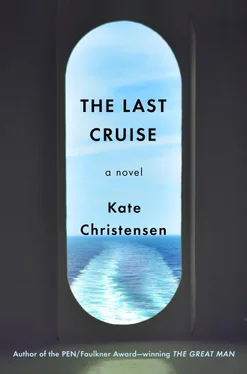She made her way down the stairs to the breakfast room, passing a few people sitting in the stairwell of the upper deck. More stood at railings, looking out at the morning sun on the ocean, while others lay sleeping in deck chairs under motionless white bedsheet ceilings. Unlike the military precision of the crew’s camp, the passengers’ cobbled-together tent city looked scruffy and ragtag, all sagging sheets and rumpled blankets. The passengers themselves looked little better, on the whole, their general mood seeming to hover between anxious waiting, festering outrage, and a collective paralysis of will, gone slack in the heat. People sprawled in underwear and T-shirts on mattresses, publicly asleep and half naked, vulnerable as homeless bums in doorways. Others wandered around aimlessly, looking wild-eyed, dazed, hair sticking up, Band-Aids stuck on various places, chests peeling, noses red from sunburn. Miriam’s heart went out to them, so far from home, normally dignified and settled people with houses, grandchildren, histories, longtime careers and jobs they’d retired from or still had.
From the breakfast buffet room, she fetched a plastic cup of the food the kitchen crew had provided: raw oats and cut-up, overripe fruit, soaked overnight in water to make a half-fermented, pasty gruel, and ladled out of a large soup pot. They were calling it “muesli” in a feeble attempt to make it more appetizing, but it looked revolting.
Ascending to Rivka’s suite out of the grimy chaos of the rest of the ship, Miriam felt the usual twinge of guilt that she got to live in luxury when so many others, some no younger than she was, had to sleep on deck chairs in the open air. What was worse, most of them had paid for this cruise. She had to remind herself again of all the lawsuits that would be filed when they got back to land, the millions of dollars in payouts Cabaret would have to make to these people for their many days of discomfort. From that perspective, it almost seemed worth it, but of course not entirely.
“Don’t bother with that, I can’t eat it,” Jakov said, waving away the food as she held it out to him. He lay flat on his back on his couch in boxer shorts and undershirt.
“You need to eat something, Jakov,” she said, lowering herself into the chair by his bed. He hadn’t eaten anything in two days. “Even if it’s just a couple of bites. You need strength to recover.”
“What are you, my mother? I have no appetite! This might be a good thing.” He patted his belly.
“Oh Jakov,” she said. She wished there were enough water to give him a cool bath, ice to offer him to suck on; things she’d done for her children when they were feverish. But she didn’t want to eat that stuff either, to be honest. He closed his eyes again, and she got up and carried the cup of food to the balcony off Rivka’s bedroom. The door was open, and Isaac and Rivka sat looking out at the ocean. Miriam sat down beside them in an empty chair.
“How is Jakov?” Isaac asked, rousing himself.
“Not too well,” said Miriam. “He won’t eat. Does anyone want some breakfast?”
Rivka ignored her. Isaac took one look at the cup and looked away again without a word. Just to spite them both, Miriam forced herself to take a bite of the sweet, sticky gruel. It wasn’t so bad once she got started. She was hungry.
“Where is Sasha?” Isaac asked, managing to infuse the question with pathos, jealousy, accusation, and genuine interest, all at once.
“Still asleep,” said Miriam. “He lies awake all night. He wishes he could do something to help. But those engines down there aren’t anything like the ones he learned how to fix in the war.”
“The big hero,” said Isaac.
“Well, he is a hero,” said Miriam, possibly a little too defensively. “He wishes he could help save us.”
“While we sit here like pashas,” said Isaac.
She laughed. Isaac looked pleased, as if he had won something. He had always been able to make her laugh, even when they were fighting.
“And Larry, sitting in a hotel room in Honolulu,” Rivka burst out. “Speaking of big heroes. I hope he chokes on a fishbone.” She stared belligerently at Miriam and Isaac. “Do you know how much money he has? And Cabaret, do you know how much their yearly profits are? They could double everyone’s salary, all the workers in the whole company—triple, quadruple, even—and not feel a thing. Do you know, just the other day, I heard Larry talking about how it isn’t good for workers to be paid too much or be treated too well, because it makes them soft and lazy. He said that! Larry! My husband!”
“That’s horrible,” said Miriam, uneasily. Rivka’s rage helped nothing, as far as Miriam could see. It just made everything worse, in fact. What was the point of dwelling on all this?
“He never used to be like this,” she said. “He used to be the nicest guy I knew. Kind, generous, with a strong work ethic, and every other kind of ethic. How did he turn so corrupt? I don’t think I realized what a terrible person he’d turned into until I saw him get into that helicopter. I’m finished with him now. That was it.”
“He’s been very generous to us, the Sabra Quartet,” said Miriam with feeble and half-hearted loyalty. “For many years.”
Rivka turned to look at Miriam. Her eyes glittered. “Do you want to know something else? This ship is a rusted piece of junk. They painted over the rust. You can see it! Just painted right over it. They cut so many corners it’s a wonder this thing even floats.”
Miriam felt Rivka wanting her to share in the outrage, to echo it back to her and draw it out of her even more so they could sit there in a hot, sticky web of it all day. She got up, too agitated to sit still any longer.
“I have to go,” Miriam said, tossing her empty cup and spoon in a wastebasket for the crew to pick up when they came through. For all she knew, they were throwing it all into the ocean at this point. And who could blame them?
“Where to?” Isaac asked accusingly.
“I can’t sit still,” Miriam told him. “I think I’ll wander around and see if I can help somehow.”
“Write if you get work,” said Isaac.
*
Christine was awake and lying in bed, looking out through the open balcony door at the dawn, when Valerie came in. Her eyes looked red-rimmed.
“Hey,” said Christine. “Where were you all night?”
“On the main deck,” said Valerie. She stood over Christine, panting gently, as if she’d just been sprinting. “I’ve been listening to the crew’s stories, taking notes as fast as I can write. God, I hope I can do this justice. It feels so much bigger than one chapter of a book. The story of this cruise could be a whole book in itself.” She paced around, restless, clicking her ballpoint pen, riffling the pages of her notebook. “The whole industry is so corrupt, it’s almost hard to believe some of these things. Murders and rapes on ships, covered up. People disappearing, and falling overboard. The workers are basically owned by the company. They even tell them when they can go to the bathroom! These people have absolutely zero rights. No wonder they’re striking. They have nothing left to lose.”
Christine got out of bed and pulled on yesterday’s grubby shorts, put her hair up in a ponytail, and rubbed some lotion on her face. “I’m off to work,” she said. “You’re on the night shift, I’m on the day shift.”
Valerie laughed. “I hope your boss lets you take breaks. I hope he feeds you. The food that most cruise workers get is horrible. It’s crap. While the passengers eat like lords and ladies.”
“Well, now we’re all eating crap together,” said Christine. “I just hope there’s enough to go around.”
Читать дальше












